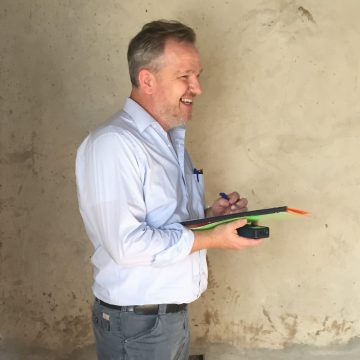“It is a challenging puzzle of species, feed type, genetics, knowledge and system design”
Frans Aartsen MSc, aquaculture engineer and expert in quality management and business development, has just returned from Kenya and Rwanda. Guiding the Kenyan farm management through an EMA certification audit and implementing a recently engineered farm design in Rwanda are only a few examples of the varied portfolio of the owner of Holland Aqua. From his office, he shares his views on the aquaculture sector, RAS and future developments.
Aquaculture is a joint venture
Projects in the aquaculture sector often require coordination of a large number of parties. How has aquaculture become so complex?
“It has always been a complex matter, even when I started in the 1990s. But we are continuously dealing with new insights, markets and technologies. As a fish farmer, you are only one link in a very versatile, even fickle supply chain. This is why it is a fragile business. They say “it takes a village to raise a child”, but the same goes for fish. Besides the various chain partners, there often are several stakeholders within a project: investors, but also companies specialized in sales, processing, farming techniques, construction and biology. In order to achieve corporate goals, a clear overview of the technical and biological feasibility should be present – preferably beforehand.”
Feasibility of aquaculture projects
When you perform feasibility studies, which questions do you seek to answer?
“Are the production expectations in line with reality, is the technology sufficient, does it fully fit into the financial feasibility? Questions that are playing an increasingly important role in the more capital-intensive fish farming sector. Nowadays, farmers need specialized advisors to look into these issues. Fish farming is a form of primary livestock production with supply to the commodity market, often at a competitive price. All stakeholders should be well-informed in advance about the technical and financial feasibility and sensitivities of their business plan.”
No RAS should be the same
Recirculation Aquaculture System (RAS) is a widely accepted production technique. However, it has to be adapted to fish species, local environment and climate conditions and be affordable at the same time. How can this be done?
“Yes, it is a challenging puzzle of species, feed type, genetics, knowledge and system design. It requires an integrated approach: How much heat does a fish produce? How do you efficiently bring oxygen into the water? How do you best dispose of the waste? Questions that can only be answered on the basis of experience and expertise. An intensive RAS system in the desert should simply be built differently than a standalone fish farm in the mountains. With the development of the FisHub system, for example, we have a telling example of how RAS technology can be made available, affordable and implementable in Africa.”
Does this mean that FisHub can only be implemented in African countries? “No, it can be implemented anywhere. Even African countries can differ immensely from each other. But it will require recalculation. The optimal design for a fish farm depends strongly on species, local climate conditions and supplier options.”
Technical approach, practical experience
From the seventies, fish farming has slowly developed into a serious production sector. The sector has seen an autonomous growth in natural locations such as large rivers, extensive coastal strips and depth fjords. Unfortunately, these areas are limited and the impact of open cultivation on the environment is too large. How does Frans Aartsen see the future development of aquaculture? “In order for aquaculture to grow in a sustainable manner, a more technical approach of the farming and production process should be developed for each separate species of fish. A technical challenge, in which the use of experienced experts has proven to be highly relevant. My advice to starting hatchery and farm managers would be to literally work at a farm for a few months before starting to build your own. The hands-on experience gained during internships and practical training is crucial for successfully running a fish farm.”
